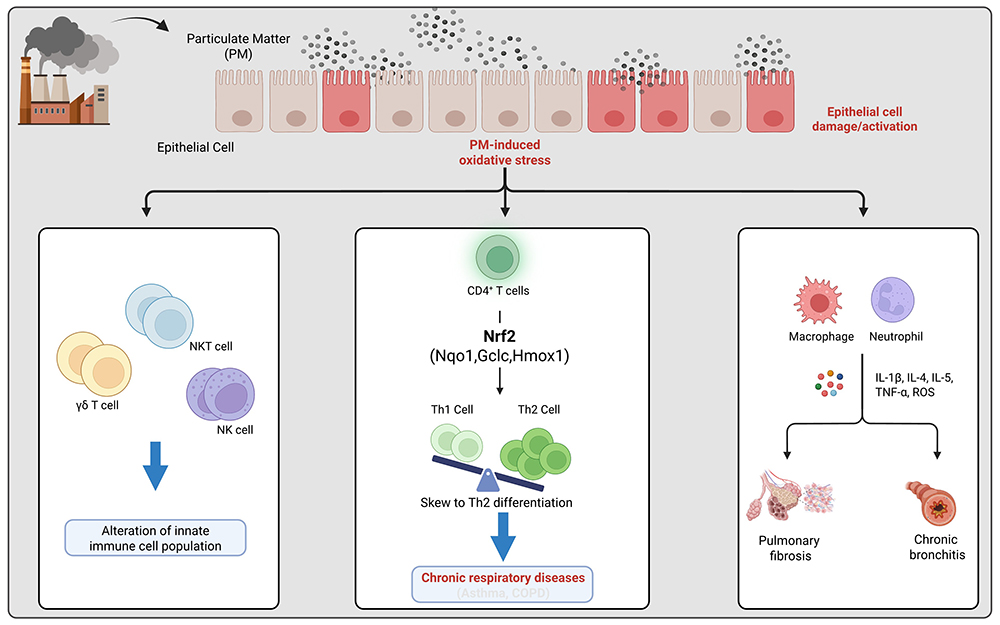
PNU 리서치
- 메인으로 이동
- 연구/산학
- PNU 리서치

의학과 홍창완 교수와 양산부산대병원 의생명융합연구원 류지현 교수 연구팀이 미세먼지(PM·Particulate Matter)가 폐의 면역체계에 미치는 심각한 영향을 과학적으로 입증했다. 연구팀은 장기간 미세먼지에 노출될 경우, 폐의 면역균형이 무너지고 심각한 염증 반응이 유발돼 알레르기성 폐질환의 발생 위험이 높아진다고 밝혔다.
이번 연구는 현대사회에서 점점 더 심각해지고 있는 미세먼지 문제에 대한 과학적 대응의 일환으로 진행됐다. 미세먼지는 초미세먼지(PM2.5, 입자의 지름이 2.5마이크로미터 이하)를 포함해 직경이 매우 작은 입자들이 공기 중에 떠다니다가 호흡기를 통해 인체로 흡입되는 환경오염 물질이다. 그동안 단기적인 호흡기 불편이나 심혈관계 질환과의 연관성은 일부 밝혀져 왔으나, 장기적인 노출이 폐 면역체계에 미치는 영향에 대한 연구는 부족한 실정이었다.
연구팀은 실험용 쥐 모델을 대상으로 16주간 미세먼지에 노출시킨 결과, 폐 조직 내에서 염증세포의 급격한 증가와 폐 조직의 심각한 손상을 관찰했다. 이는 단순한 자극 반응을 넘어 조직 수준의 병리학적 변화를 나타내는 것으로, 특히 폐를 보호하는 면역세포인 T세포의 균형이 깨져 알레르기 반응을 일으키는 특정 세포군이 비정상적으로 증가하는 것을 확인했다.

【미세먼지의 폐질환 영향 연구 모식도】
이러한 결과는 미세먼지가 단순히 일시적인 호흡기 자극을 넘어, 만성적인 염증 상태를 유도하고 알레르기성 천식과 같은 만성 호흡기 질환을 유발할 수 있는 중요한 위험 인자임을 과학적으로 뒷받침하는 것이다.
이번 연구는 미세먼지의 장기 노출이 면역체계의 근본적인 변화를 일으킨다는 점에서, 미세먼지 노출을 최소화하고 면역체계를 보호하는 질병 예방 및 정책 수립에 있어 보다 근본적이고 심도 있는 접근이 필요함을 시사한다.
연구 책임을 맡은 홍창완 교수는 “미세먼지가 건강에 미치는 영향을 단순히 호흡기 질환의 악화로만 생각하지 말고, 면역체계 전반에 미치는 심각성을 인식하고 적극적으로 대처해야 한다”고 강조했다.
미세먼지의 폐질환 영향을 다룬 이번 논문은 국제 학술지 『리독스 바이올로지(Redox Biology)』 5월호에 게재됐다.
- 논문 제목: Particulate matter exposure induces pulmonary Th2 responses and oxidative stress-mediated NRF2 activation in mice (미세먼지 노출은 마우스에서 폐 Th2 면역반응과 산화 스트레스 의존적 NRF2 활성화를 유도한다)
- 논문 링크: https://doi.org/10.1016/j.redox.2025.103632
이번 연구는 한국연구재단이 지원하는 개인연구사업의 중견연구 와 세종과학펠로우십 사업의 지원을 받아, 의학과 홍창완 교수와 양산부산대병원 의생명융합연구원 류지현 교수가 교신저자, 의학연구원 조유나 연구교수, 양산부산대병원 의생명융합연구원 김보영 박사가 제1저자로 수행했다
* 상단 연구진 사진: 왼쪽부터 (앞줄) 류지현 교수, 홍창완 교수 (뒷줄) 김보영 박사, 조유나 연구교수.
[Abstract]
Particulate matter (PM) is a broad-spectrum risk factor for the respiratory and cardiovascular respiratory systems. The impact and underlying mechanisms of adaptive immune responses in PM-induced pulmonary inflammation remain largely unexplored. In this study, we established a mouse model for long-term exposure to PM2.5 and PM10 via intranasal instillation and performed a comparative analysis of the effects on adaptive immunity, specifically T cell immune responses. PM-exposed mice exhibited overall increased pulmonary injuries, inflammation, fibrosis, oxidative stress, and apoptosis, with a more pronounced effect in PM2.5 than PM10. Alongside pulmonary inflammation, IL-4-producing CD4+ T cells were increased, whereas the IFNγ- and TNFα-producing CD4+ T cells were decreased. PM exposure induced the expression of Th2-type cytokines in bronchoalveolar lavage fluid (BALF), which elevated the levels of IgE and IgG1 in the plasma. PM-activated nuclear factor erythroid-2-related factor 2 (Nrf2) and its downstream genes and overexpression of Nrf2 skewed CD4+ T cells toward Th2 differentiation in Nrf2 Tg mice. The negative effects of PM were more enhanced in the PM2.5 than PM10 exposure models and associated with TH2 immune responses. These findings highlight how PM exposure disrupts immune balance and exacerbates conditions like asthma and chronic obstructive pulmonary disease by promoting TH2-driven inflammation through NRF2 activation.
- Authors: Yuna Jo (Research Institute for Medicine, Pusan National University), Bo-Young Kim, Ji Hyeon Ryu (Research Institute for Convergence of Biomedical Science and Technology, Pusan National University Yangsan Hospital), Changwan Hong (Department of Medicine, Pusan National University)
- Title of original paper: Particulate matter exposure induces pulmonary TH2 responses and oxidative stress-mediated NRF2 activation in mice
- Journal: Redox Biology
- Web link: https://doi.org/10.1016/j.redox.2025.103632
- Contact e-mail: chong@pusan.ac.kr
